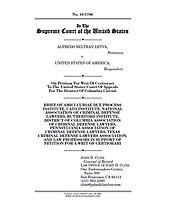Learn more about Cato’s Amicus Briefs Program.
To convict a criminal defendant at trial, the state must rely on evidence that meets strict constitutional and other legal standards: witnesses must appear in person, testify under oath, and be subject to cross-examination; the Federal Rules of Evidence generally prohibit hearsay statements; and the evidence must ultimately establish the defendant’s guilt beyond a reasonable doubt. But at sentencing, which may often be the more practically significant stage of criminal proceedings, none of these protections apply. Federal judges routinely sentence defendants based on the hearsay statements of convicted criminals trying to reduce their sentences through cooperation, which are relayed to the court at sentencing only by law enforcement officers. The cooperating criminals do not appear in court, do not swear an oath to tell the truth, and do not face cross-examination. And their out-of-court statements need only persuade the judge by a preponderance of the evidence, not beyond a reasonable doubt.
Beltran Leyva faces a life sentence based on exactly this sort of evidence. He pled guilty to a narcotics importation conspiracy, which resulted in a Sentencing Guidelines range of “only” 235–293 months (already a wildly disproportionate sentence, but beside the point here). But as a result of enhancements that were based entirely on two agents reciting three unobserved cooperators’ unsworn hearsay claims, he received a life sentence instead. These unsentenced, Spanish-speaking cooperators all received favorable plea deals, but had also committed various crimes of dishonesty throughout their lives, including bribery—indeed, one was convicted of attempting to bribe a Bureau of Prisons officer after making a cooperation agreement with the government. Two of them barely knew Leyva, and the third was a Mexican policeman working for drug cartels. Had they testified, these issues would have been valid grounds for cross-examination and impeachment. But the district court refused to require their in-court testimony, despite Leyva’s continued requests; instead, their claims were filtered through the agents—one of whom did not even speak Spanish—and who admittedly never corroborated their sources’ claims.
In upholding Leyva’s sentence, the D.C. Circuit relied on the highly deferential “abuse of discretion” standard, and gave “especially strong deference” to the district judge’s “credibility determinations.” But here, of course, the district judge could not possibly have been making credibility determinations as to the underlying sources, because they never testified. Leyva therefore filed a cert petition, asking the Supreme Court to resolve a three-way circuit split on the correct standard of review to assess the reliability of fact-finding in federal sentencings following guilty pleas.
The Cato Institute, along with several other public-policy groups and academics, has filed an amicus brief in support of this petition, arguing that meaningful appellate review is one of the few safeguards defendants have against sentencing enhancements backed only by cooperator hearsay. De novo review by courts of appeals ensures at least that the reliability of cooperators’ statements will receive a second level of careful scrutiny, and it comports with the rationale for heightened appellate scrutiny generally. The stakes—a person’s right to due process of law before losing their liberty—are high, and because the district court never observes the cooperator’s demeanor, the appellate court is just as capable of evaluating credibility. Especially in light of the fact that guilty pleas have all but replaced jury trials as the baseline of criminal adjudication, it is all the more important now that the Supreme Court does not further erode the limited evidentiary protections that defendants have at sentencing.

This work is licensed under a Creative Commons Attribution-NonCommercial-ShareAlike 4.0 International License.
